Decluttering
Many years of experience
and trust
Much valuable customers
Certified professional in
Maharashtra
Making your home the best

Decluttering provided by Wendy
What is Decluttering?
Decluttering is the process whereby you decide whether the items in your space are cluttered and, if so, determine where they belong and acts on that decision. By enabling you to understand why you have clutter in the first place, the process will help you make a permanent change. In addition, by organizing your environment, you'll focus better and get more done in a shorter time.
Why is Decluttering important?
Clutter affects our emotional and physical well-being in several ways. For example, clutter in the office can make us feel unproductive and burnt out. The benefits of decluttering the physical space are unsurprising, given that exposure to cluttered, disorganized surroundings can compromise your attention, concentration, and focus. According to prior research on the results from functional magnetic resonance imaging (fMRI) scans, disorder even depletes your cognitive resources.
Of course, the office isn't the only place you'll find clutter. Clutter in the home can affect your life as well. For example, survey responses from a paper published in the Journal of Environmental Psychology in June 2016 (Ferrari and Roster) showed that clutter harms the subjective well-being and happiness of most adults in the United States and Canada.
Clutter can also be a safety hazard. Items or wires on the floor can cause someone to stumble. A health hazard exists if piles of stuff have become magnets for pests. In addition, clutter can act as a source of friction between people with different ideas regarding tidiness.
The benefits of Decluttering
Untidy environments elevate stress for most people. For example, in one study, people who described their homes with positive language had a lower cortisol level than those who described their homes as cluttered or unfinished.
For most people, decluttering can promote productivity and improve mental and physical health. Benefits of decluttering include:
Better focus: Clutter makes it tough to find what you need. It may also distract you. Removing visual clutter can help you focus better on any task.
Higher self-esteem: When staying organized is troublesome, you may feel out of control. Enhancing your living space can restore feelings of competency and pride.
Better relationships: Conflicts with family or roommates often occur when someone can't handle clutter. Also, you may be more comfortable inviting friends into your home when it's tidy.
Reduced risk of health issues: You may think your house is disorganized but not dirty. But it's difficult to clean around heaps of belongings. Decluttering can deter pests and reduce dust, mold, and mildew, which may trigger asthma and allergies.
Improved lifestyle and well-being: It's easier to prepare healthy meals in a tidied kitchen. And most people sleep better in a neat room with a neat bed.

Find out how Wendy can help declutter your daily life!
Of course, organizing isn't just about tidying up; it's also about freeing up space so you can live more comfortably. I love working with clients to help them declutter their homes, reorganize their furniture, and shed excess weight without feeling overwhelmed or stressed out. My goal is always to relieve clutter-related stress while helping families maximize their living spaces.


